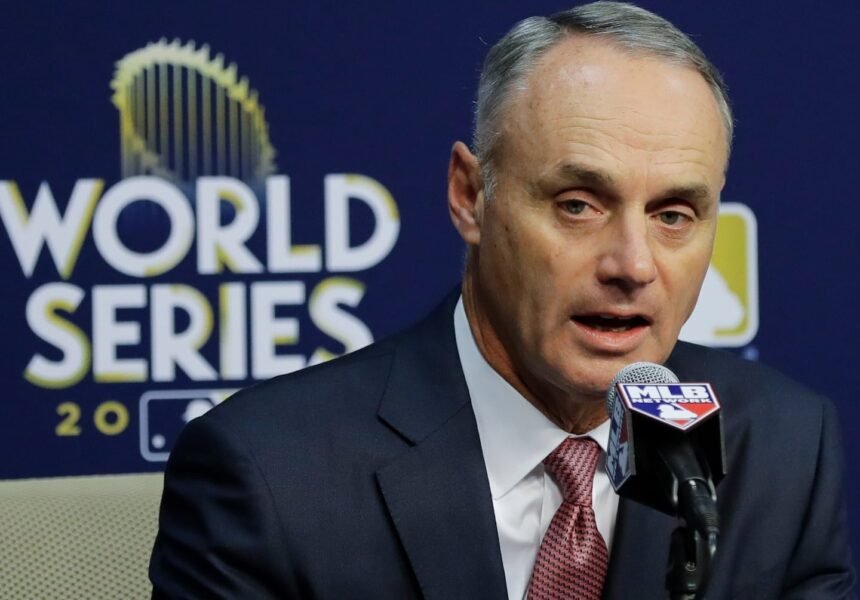Maybe, MLB needs a metaphorical mound visit and a pep talk because before anyone can believe in your product, you have to believe in it yourself.
The message delivered by the television wasteland start day for the 121st World Series is unmistakable. You’re telegraphing a loss of relevance and a lack of confidence by relegating your premier event to a Friday night, desperately dodging NFL football on Thursday night, a more coveted viewing window. Game 1 of the World Series deserves a better and bigger stage.
If you think I’m exaggerating about MLB being cowed by Roger Goodell and the iron-fisted popularity of the NFL, just look at the scheduled offdays for the Fall Classic. They’re Sunday and Thursday. Coincidence?
The World Series appears content to be baseball background noise to football’s Coachella.
Yes, the sepia-toned heyday of people huddling around radios or TVs to watch the World Series like their life depended upon it is over. It’s a Rockwellian tableau from a simpler time. While there are myriad attempts at retrograde cultural attitudes in this country, there’s nothing that will restore the World Series to the zenith of the zeitgeist.
Still, baseball can grow the game. The product is compelling and time-friendly since the advent of the pitch clock, which all but abolished the interminable slogs the Red Sox and Yankees engaged in during the early aughts. The exploits of Cal Raleigh, Shohei Ohtani, Aaron Judge, Paul Skenes, and the great story of the unbeatable Brewers provide ample material to market.
Baseball isn’t Broadway anymore relative to the NFL and college football, but it shouldn’t settle for community theater status.
MLB national TV ratings are up this year across multiple platforms, and the league boasts several suitors for the assets ESPN opted out of. That includes ESPN, which is launching a new streaming service on Aug. 21. According to The Athletic, Netflix, NBC and its Peacock streaming service, Apple TV+, and ESPN have all expressed interest in MLB rights packages.
Some of this scheduling is self-made by MLB and doesn’t involve deferring to football, although the league canned flexible scheduling that would’ve allowed the Fall Classic to begin earlier than a Friday if the matchup was set.
Sometimes more is less. The introduction of the third wild card has watered down the postseason and the World Series. It might be the savior of the Red Sox this season, but it’s a false idol in this corner.
The last time the Red Sox made the playoffs (2021) was the last time MLB’s postseason didn’t include three wild-card berths in each league.
Before 2022, the first season of baseball’s bloated 12-team postseason, the World Series hadn’t commenced on a Friday since the Woodrow Wilson administration. You had to go back to 1915, when the Red Sox defeated the Phillies in five games.
Every year of the third wild card has featured the World Series starting on a Friday. This year, if there’s a Game 7, the hero can call himself Mr. November since it will take place on Saturday, Nov. 1. It’s not ideal to start your marquee event on a Friday and end it on a Saturday.
(The iconic 1975 World Series between the Red Sox and Reds went seven games, thanks to Carlton Fisk. It finished on Oct. 22, despite having three consecutive rainouts before the indelible Game 6.)
The argument is that the third wild card keeps more teams and their fans engaged in the playoff chase longer. It creates more meaningful games during the regular season. But at what expense to the World Series?
Paucity of postseason teams and games used to be MLB’s brand separator. No more.
Having three wild cards increases the quantity of postseason games with two best-of-three series involving the wild-card clubs instead of the old one-game playoff between two wild cards. But it’s debatable whether it improves the quality of the postseason, especially with the top two division winners in each league put on ice until the wild-card round concludes.
No third wild card has cracked the 90-win mark. The average win total of a third wild card is 86.8. Two third wild-card teams have reached the World Series — the 87-win Phillies in 2022 and the 84-win Diamondbacks in 2023. Both lost.
Admittedly, World Series ratings have diminished.
Pre-pandemic, the World Series had never generated a rating lower than 8.0. Since 2020, the World Series has failed to crack a 7.0, although it came very close last year with two marquee franchises, the Yankees and the Dodgers. That Fall Classic earned a 6.9 rating, the highest since 2019.
My bet is that if Game 1 of that series hadn’t started at 8:08 p.m. on a Friday, the Series would’ve reached 7.0.
Starting the World Series on a Friday night is beneath the event’s lofty historical status. It’s sports competition capitulation that signals that it matters less than it should. That it doesn’t merit front and center consideration.
It also forces baseball to make its best pitch with one hand of time tied behind its back.
Christopher L. Gasper is a Globe columnist. He can be reached at christopher.gasper@globe.com. Follow him @cgasper and on Instagram @cgaspersports.











